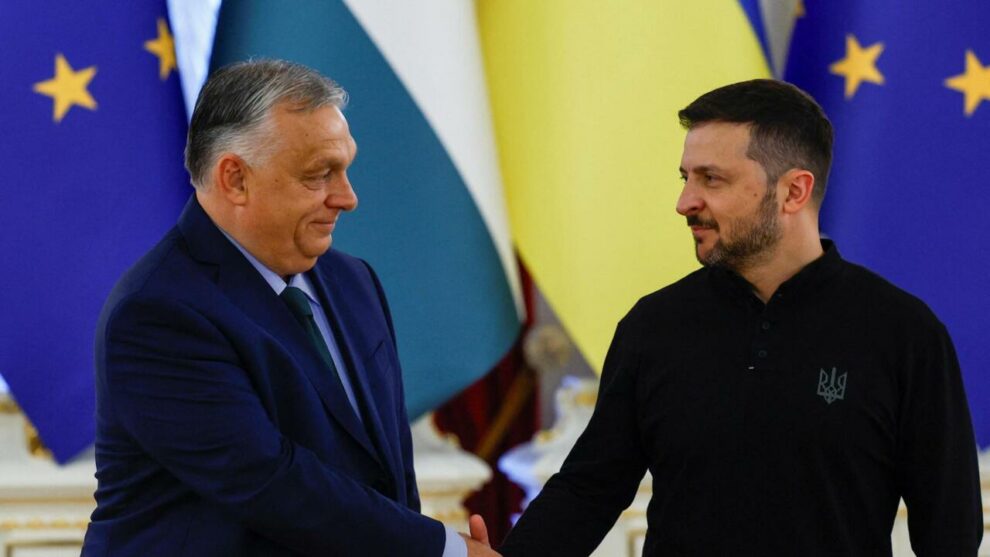The Hungarian foreign minister tried to raise the temperature over Ukraine’s Hungarian minority in a UN speech. But Budapest’s current strategy concerning ethnic-Hungarians in neighbouring countries appears inconsistent and self-defeating.
“The Hungarian community in Transcarpathia have been subjected to serious restrictions and violations of their rights,” Hungarian Foreign Minister Peter Szijjarto told the UN Forum on Minority Rights in Geneva on Friday, in a speech during which he called for intervention by the international community to help end the alleged ill-treatment of the small Hungarian minority in West Ukraine.
His comments were picked up enthusiastically by the Hungarian government’s social media channels and the Russian state media agency Tass. Yet many observers are sceptical about Budapest’s continued use of the language issue as justification for impeding closer ties between Ukraine and NATO and its generally negative attitude towards President Volodymyr Zelensky’s government.
Ukraine’s ‘language law’ of 2019 reinforcing the normative status of the state language in public institutions (and especially schools) was primarily aimed at countering Russia-influence efforts within the country. However, it occasioned protests from Hungary, which cited contradictory provisions for the institutions of the Hungarian minority (150,000 strong according to the 2001 census) in a 1991 bilateral treaty.
Most of the contentious restrictions have in fact since been removed by amendments to the law introduced under EU pressure. Yet Budapest is keeping up the volume on the matter unabated and seems unwilling to acknowledge Ukraine’s concessions.
The government’s stance contrasts oddly with the Hungarian government’s seeming unwillingness to raise the matter of harsh restrictions on the use of Hungarian in Slovakia (home to about 450,000 ethnic Hungarians), according to a leak of plans by Robert Fico’s hardline nationalist government in November.
Envisaged restrictions in Slovakia would prohibit the use of minority languages on public transport, at post offices or on restaurant menus. Violations would incur a fine of 15,000 euros.
Despite obvious evidence to the contrary, Szijjarto told the Hungarian state news agency MTI that, “the potential new language legislation will not pose any threat to the use of the mother tongue for ethnic minorities living on the territory of Slovakia.”
The apparent inconsistency between the two approaches strongly suggests that, despite generous spending on the various Hungarian communities abroad, the Orban government’s selective concern over the minority issue has other motives. Also, despite apparent dissimilarities, these policies towards the Hungarian communities in neighbouring countries could have the same long-term effects: damaging both their interests and their trust in the Hungarian government.

Instrumentalising Hungarians in Slovakia and Ukraine
Today Dr Istvan Zalatnay is a university lecturer in Budapest, but earlier he served as vice president of the Government Office for Hungarian Minorities Abroad (1992-94). Zalatnay thinks the discrepancy in the Hungarian government’s response to the situations in Ukraine and Slovakia should be understood in terms of cynical calculations on the prime minister’s part.
“Orban’s politics concerning Hungarian minorities is determined almost exclusively by his own interests… Orban has no principles, and this field is no exception,” Zalatnay tells BIRN.
According to Zalatnay, Orban inflames the dispute over language rights in Transcarpathia so as to “stir animosity towards Ukraine inside Hungary —thereby legitimising his pro-Russian politics to the Hungarian public”.
Conversely, as Orban regards Slovakia’s present radical-populist prime minister, Robert Fico, as a friend, “he doesn’t bother a bit about the Hungarians living there when their rights really seem to be increasingly curtailed. Having Fico as an ally is just too important to him,” he says.
Karin Kovary Solymos, an ethnic-Hungarian journalist at the Investigative Centre of Jan Kuciak in Bratislava, highlights the strange impact that Orban’s approach is having on Hungarian politicians in Slovakia, who now seem to be more reserved regarding their own interests. The new language restrictions are a topic on which leaders of the largest Hungarian party, the Fidesz-linked Magyar Szovetseg (Hungarian Alliance), would be expected to take a more visible stand. Yet, Kovary Solymos observes, “local Hungarian politicians are seemingly holding back” as they wait for the Hungarian government and Fidesz to come to help the community over this issue.
The situation is ironic: in 2023 Orban seemed to encourage Slovakia’s Hungarians to support Peter Pellegrini and Robert Fico in presidential and parliamentary elections, respectively – the latter at the expense of Hungarian parties, which failed to make it past the 5 per cent threshold to enter parliament.
Hungarian state television is widely watched in Hungarian communities in Slovakia. Leading up to Slovakia’s elections in 2023, it featured pictures of friendly meetings between Orban and Fico and Pellegrini. “It wasn’t hard to join the dots on the choices being encouraged,” Kovary-Solymos tells BIRN.
In Ukraine, about half Transcarpathia’s ethnic-Hungarians are thought to have left (mainly for Hungary) since Russia’s 2022 full-scale invasion. The positioning of Orban’s government, however, is opening up a gap in sentiment between it and the ethnic-Hungarians who remain.
Speaking as a private individual, not as a political analyst or community representative, Andras Soltesz, an ethnic-Hungarian journalist in Transcarpathia, says that support for Orban’s stance in his community appears limited. “Of course, among local Hungarians there are those who support certain points of Orban’s position, but this isn’t widespread,” he argues.
Indeed, “local Hungarians who went to war voluntarily are proud to be defending Ukraine – and many other local Hungarians are proud of them too”. The Hungarians who remain, he says, “just want to carry on their daily business – they’ve long grown tired of news about frictions between Budapest and Kyiv”.
Fortunately, according to Soltesz, Ukrainians in Transcarpathia understand that “Orban’s position is his position as a politician and prime minister of Hungary – not the position of the local Hungarian minority”.
Soltesz does worry, though, that the stand-off could harm perceptions of the Hungarian minority in Ukraine more generally: “When I was monitoring that situation more closely in 2022-23, I could see an uptick in expressions of hostility towards the minority online from Ukrainians outside the region.”
As Hungary’s foreign minister in the early 1990s, Geza Jeszenszky negotiated the basic treaty which is now in dispute. He takes a nuanced view of the situation. “It’s clear that the present Ukrainian language law isn’t compatible with what was agreed in the treaty – that’s a genuine problem and one which needs to be addressed,” he tells BIRN.
Nevertheless, he criticises Orban’s approach: “both the tone and the methods are counterproductive”.
Rather, given that Ukraine is fighting for its survival against a brutal invader, Jeszenszky argues that, “the best way to help the Hungarian minority is to build goodwill in Kyiv by offering Ukraine every kind of friendly support in the present crisis”.
Certainly, “it is self-defeating to use the situation in Transcarpathia as a pretext to oppose multilateral assistance,” he adds.
Jeszenszky is sceptical about Orban’s reasons for escalating the minority issue. Orban’s strategy, he asserts, is motivated “primarily by his proximity to [Vladimir] Putin, not by a deep concern for Hungarians in Ukraine”.
Uncertainty in Romania
Romania’s parliamentary elections on Sunday produced the most fragmented results since 1990, with far-right parties surging on the coat-tails of Calin Georgescu’s shock first round presidential election victory a week before.
The Democratic Alliance of Hungarians in Romania (UDMR in Romanian, RMDSZ in Hungarian) did well, gaining 6.3 per cent, its best result in 20 years, with a share of seats slightly above that number in both the Senate and Chamber of Deputies. Uncertainty now surrounds the role that the party might play in the formation of a new government
“At this point all scenarios are on the table,” says Zoltan Sipos, editor-in-chief of Atlatszo Erdely, a Hungarian-language news portal in Romania. However, in his view, “if RMDSZ gets a chance to join a future government, then I think they’ll take it – but likely not at the price of a coalition with the populist parties”.
Istvan Zalatnay notes that centrist parties can, mathematically speaking, form a government without RMDSZ, but “it would be an uncomfortably thin majority, given the scope for partners to disagree on policy”. Thus, the new president – Georgescu is due to face a runoff against Elena Lasconi on December 8 – “might want to bring RMDSZ in for safety”.
UDMR/RMDSZ is often perceived as lacking independence from Fidesz and receives indirect financial support from Hungary via associated organisations. Hungary’s government is also a major funder of cultural, educational and social institutions in the localities that the party represents in Romania.
Interestingly, however, while first Fidesz and latter its domestic satellite KDNP quit the European Parliament’s centre-right grouping, the European People’s Party (EPP), for the radical Patriots for Europe (PfE), UDMR/RMDSZ has stuck with Europe’s moderate conservatives, suggesting a different outlook.
Experts warn against drawing quick inferences about Orban enjoying leverage over a future Romanian government through the party. “RMDSZ was colonised by Fidesz but I suspect that a number of its leaders are uneasy,” Zalatnay observes.
The rise of Hungary’s opposition star, Peter Magyar, means that “RMDSZ politicians may fear what a change of the tide in Hungary could mean for them”, Zalatnay says. “I can’t think Fidesz’s breach with the EPP was very comfortable for RMDSZ.”
Sipos is similarly cautious. “We know very little about day-to-day communications between RMDSZ and Fidesz. We don’t know whether important political decisions are co-ordinated… I’d prefer not to speculate on what the inter-party links might mean in government, it’s pretty unclear,” he says.









